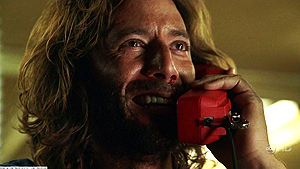Congratulations to Ian and Sonya Walger, writers Damon Lindelof, Carlton Cuse and director Jack Bender for making the best TV episode of the century!
The 100 Best TV Episodes of The Century
“The Desmond-centric time-travel yarn is a microcosm of everything Lost did expertly, and, just as crucially, it contains none of the pitfalls that hampered later installments. It’s a pitch-perfect modern TV cocktail, one part sci-fi, one part romance, one part reimagining of The Odyssey, with an Easter egg garnish, on freighter rocks.
WHAT IS THE EPISODE’S MOST ICONIC MOMENT?Do you remember what it felt like to hear that phone ring? To wonder whether Penny, on December 24, 2004, would pick up as Desmond, mad with need, unstuck in time, had begged her to back in 1996? Can you still hear that first crackly “Hello?,” still see Desmond’s brow wrinkle, pulling in on itself as he finds his anchor, fully comprehending at last what one person can be for another?
Lost was never only Desmond and Penny’s show. That, however, is part of the grand achievement of “The Constant”: Great TV doesn’t have to be about the who, but it usually has to be about the why, and in the fifth episode of its fourth season, with its main players largely sidelined or reduced to exposition-seeking roles, Lost found its why with more clarity than it had before or would after or than most shows ever do in their runs. Whether we’re on a mystical island or an ominous freighter or back in the rhythms of our own dreary lives; whether we’re in the past or the present or the future; whether we can even tell the difference; the bonds that matter most will tether us and reveal our true selves. “No matter what,” Penny says, and Desmond answers: “I’ll come back to you.” And so will we, to “The Constant.” I promise.
HOW DID THIS EPISODE INFLUENCE THE FUTURE OF TV?It’s reductive to say that Lost changed television in ways both good and bad, but it’s also true. Part of the magic of “The Constant” is that it buoys the good while rising above the bad. It stands as a testament to the power of mythmaking and world building—of trusting the viewer to trace every thread of an arc, even when the characters can’t. But it also functions shockingly well as an isolated act, capable of serving as a treatise on the power of love, even if you don’t have an encyclopedic knowledge of the show’s ever-expanding mythology. “The Constant” proved that the best episodes of television can simultaneously fortify the series’s mythology and be appreciated independently, unshackled from end-game speculation. Desmond and Penny’s love story reminded us that the most rewarding 20th-century viewing experiences can give us message-board fodder while allowing us to appreciate the work free from the theories and well-actuallying that dictate so much TV discourse these days. The message of “The Constant,” like its protagonist, is timeless: The puzzle may be fun, but heart will always be the heart.”

